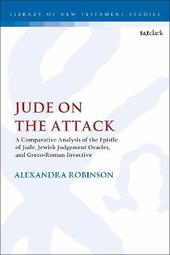
|
Jude on the Attack: A Comparative Analysis of the Epistle of Jude, Jewish Judgement Oracles, and Greco-Roman Invective
Paperback / softback
Main Details
| Title |
Jude on the Attack: A Comparative Analysis of the Epistle of Jude, Jewish Judgement Oracles, and Greco-Roman Invective
|
| Authors and Contributors |
By (author) Dr Alexandra Robinson
|
| Series | The Library of New Testament Studies |
|---|
| Physical Properties |
| Format:Paperback / softback | | Pages:272 | | Dimensions(mm): Height 234,Width 156 |
|
| Category/Genre | Biblical studies |
|---|
| ISBN/Barcode |
9780567689184
|
| Classifications | Dewey:227.97066 |
|---|
| Audience | | Tertiary Education (US: College) | |
|---|
|
Publishing Details |
| Publisher |
Bloomsbury Publishing PLC
|
| Imprint |
T.& T.Clark Ltd
|
| NZ Release Date |
27 June 2019 |
| Publication Country |
United Kingdom
|
Description
Alexandra Robinson examines the letter of Jude in the light of repeated scholarly references to this source as an invective, a polemic, and an attack speech, with a dependence on both Jewish and Greco-Roman sources. Moving beyond the 'Hellenism/Judaism divide', Robinson specifies what these elements are, and how they relate to the harsh nature of the discourse. This study shows how, where, and why Jude borrows from these contemporary genres, with a detailed survey of Greco-Roman invectives and Jewish judgement oracles; comparing and contrasting them to the epistle of Jude with consideration of structure, aims, themes, and style. Robinson argues that Jude has constructed a 'Jewish invective,' and that his epistle is a polemical text which takes the form (structure, aims, and style) of a typical Greco-Roman invective but is filled with Jewish content (themes and allusions), drawing on Israel's heritage for the benefit of his primarily Jewish- Christian audience.
Author Biography
ALEXANDRA ROBINSON is a Lecturer at St Mark's National Theological Centre, Charles Sturt University, Australia.
ReviewsRobinson is wide-ranging in her interaction with secondary literature across a vast spectrum of topics... making this a valuable reference source for graduate students and researchers. In particular, her thorough discussion of Greco-Roman invective will provide a solid starting place for scholars interested in the presence of invective in Paul or John's Apocalypse. * Biblical Theology Bulletin * [Robinson's] most helpful contribution alongside bringing the comparative material together for the reader to consider is her observation that the "form (structure, aims, and style) of the epistle is typical of a Greco-Roman invective, while the discourse is filled with Jewish content (themes and stylistic devices)" (p. 204; emphasis original). Robinson's monograph is well organized and judicious in expression, keeping its focus on the central thesis throughout. * Journal of the Evangelical Theological Society *
|